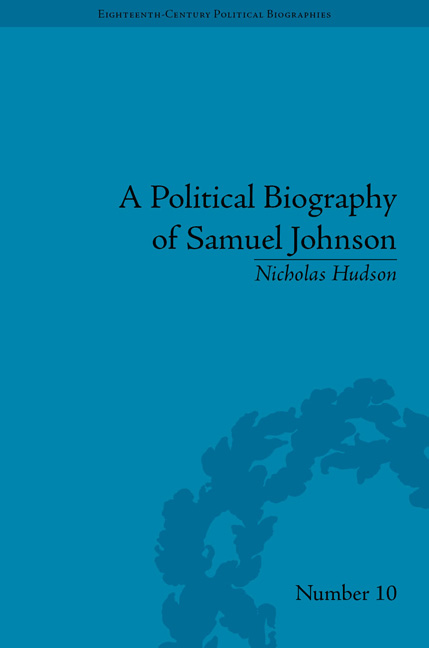Book contents
- Frontmatter
- CONTENTS
- Dedication
- Acknowledgements
- Note on the Text
- Introduction
- 1 Political Origins, 1709–36
- 2 The Patriot Opposition, 1737–9
- 3 An Independent Voice, 1740–55
- 4 The Seven Years War, 1756–63
- 5 Defender of King and State, 1763–70
- 6 Troubles of Empire, 1771–84
- Conclusion
- Notes
- Works Cited
- Index
2 - The Patriot Opposition, 1737–9
- Frontmatter
- CONTENTS
- Dedication
- Acknowledgements
- Note on the Text
- Introduction
- 1 Political Origins, 1709–36
- 2 The Patriot Opposition, 1737–9
- 3 An Independent Voice, 1740–55
- 4 The Seven Years War, 1756–63
- 5 Defender of King and State, 1763–70
- 6 Troubles of Empire, 1771–84
- Conclusion
- Notes
- Works Cited
- Index
Summary
Irene and Political Tragedy
Johnson had come to London armed with a partially completed tragedy, Mahomet and Irene, which he hoped to have accepted for performance on the stage. In the event, he could not even find someone to print the play when he tried in 1741. The renamed Irene would not be staged until 1749 with the help of David Garrick. There no evidence that this lack of enthusiasm resulted from political objections to the play, which is rather ‘provincial’ in its stolid Christian morality, as we will consider. The evident political blandness of Irene has not, however, deterred modern scholars from opposed ideological readings of this play. Donald Greene drew attention in particular to Cali Bassa's speech in act 1, scene 2, where he reflects on ‘the woes when arbitrary pow'r,/And lawless passion, hold the sword of justice’. In Johnson's original version, which we have in the form of rough notes and heavily corrected speeches, he was planning an even stronger paean to liberty in which Cali ‘launches into the misery of absolute governments’, and praises the freedom of countries ‘he has heard of in the North’ (YE, vol. 6, p. 121). This speech, Greene writes, is ‘pure Locke’. According to Paul Monod, on the contrary, the situation of Irene cries out for a Jacobite interpretation. Demetrius and Leontius are Jacobite conspirators attempting to free their country from the Sultan, George II. Cali is a crypto-Jacobite minister.
- Type
- Chapter
- Information
- A Political Biography of Samuel Johnson , pp. 33 - 56Publisher: Pickering & ChattoFirst published in: 2014



